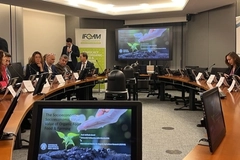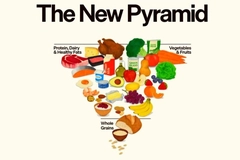IPC confirms famine in Gaza for the first time, UN agencies reiterate call for immediate ceasefire
The latest Integrated Food Security Phase Classification (IPC) analysis confirms that over half a million people in Gaza suffer from famine, marked by “widespread starvation, destitution, and preventable deaths.” In the coming weeks, the report projects these famine conditions will spread from the Gaza Governorate to the Deir Al Balah and Khan Younis Governorates.
Famine is the IPC’s most extreme category (Phase 5), which means there is reasonable evidence that the region meets the criteria of extreme food deprivation, acute malnutrition, and starvation-related deaths. The analysis projects that by the end of September, a third of the population (641,000 people) will face catastrophic levels of food insecurity across the Gaza Strip.
Another 1.14 million will be in Phase 4, Emergency, and a further 396,000 in Phase 3, Crisis. The analysis estimates that conditions in North Gaza are as severe as, or worse than, those in Gaza City. Still, limited data prevented an IPC classification, highlighting a need for access to assess and assist. The report did not analyze Rafah due to indications that this city is largely depopulated.
The UN Food and Agriculture Organization (FAO), UNICEF, the World Food Programme (WFP), and the WHO reiterate that famine must be stopped at all costs. The agencies reiterate their calls for an immediate ceasefire and an end to the conflict to enable an unimpeded and large-scale humanitarian response.
“A ceasefire is an absolute and moral imperative now,” says WHO Director-General Dr. Tedros Adhanom Ghebreyesus. “The world has waited too long, watching tragic and unnecessary deaths mount from this man-made famine.”
“Widespread malnutrition means that even common and usually mild diseases like diarrhea are becoming fatal, especially for children. The health system, run by hungry and exhausted health workers, cannot cope. Gaza must be urgently supplied with food and medicines to save lives and begin reversing malnutrition. Hospitals must be protected so that they can continue treating patients. Aid blockages must end, and peace must be restored so that healing can begin.”
The UN agencies stress the importance of an immediate and sustained ceasefire (Image credit: UNICEF/El Baba).IPC’s latest assessment marks the first time a famine has officially been confirmed in the Middle East. It reports the most severe deterioration since the organization began analyzing acute food insecurity and acute malnutrition in the Gaza Strip.
Catastrophic increase in child malnutrition
The report cautions that malnutrition is accelerating drastically among children. In July this year, over 12,000 children were identified as acutely malnourished, which the report flags as the highest monthly figure ever recorded — a six-fold increase since the start of this year.
Nearly one in four of these children was suffering from the deadliest form (severe acute malnutrition), which has short- and long-term impacts.
The report projects acute malnutrition to continue worsening rapidly. It states that through June 2026, at least 132,000 children under five will suffer from acute malnutrition, double the organization’s estimates in May 2025 of 71,000 cases between April 2025 and March 2026. This includes over 41,000 severe cases of children at heightened risk of death.
In addition, the IPC analysis says nearly 55,500 malnourished pregnant and breastfeeding women will require an urgent nutrition response, with one in five babies being born prematurely or underweight.
“Famine is now a grim reality for children in Gaza Governorate and a looming threat in Deir al-Balah and Khan Younis,” says UNICEF executive director Catherine Russell. “As we have repeatedly warned, the signs were unmistakable: children with wasted bodies, too weak to cry or eat; babies dying from hunger and preventable disease; parents arriving at clinics with nothing left to feed their children.”
Through June 2026, at least 132,000 children under five are projected to suffer from acute malnutrition, of which 41,000 severe cases (Image credit: UNICEF/El Baba).“There is no time to lose,” she stresses. “Without an immediate ceasefire and full humanitarian access, famine will spread, and more children will die. Children on the brink of starvation need the special therapeutic feeding that UNICEF provides.”
Insufficient access to food
The UN agencies stress that starvation in Gaza is the result of two years of conflict, displacement, and severe restrictions on humanitarian access, food, water, and medical aid, plus interruptions in agriculture, livestock, and fisheries. Moreover, health, sanitation, and market systems have collapsed.
Although more food and aid supplies enter the region, the organizations say this is “vastly insufficient, inconsistent, and inaccessible” compared to the need.
Food access is still severely constrained, with twice as many households reporting very severe hunger in Gaza compared to May — in Gaza City, these numbers more than tripled. Moreover, 39% of people indicated they were going days at a time without eating, and adults regularly skip meals to feed their children.
Around 98% of cropland is damaged or inaccessible, IPC reports, which has halted local food production. Food prices are extremely high and aid operations are severely disrupted, with the UN saying most of its trucks are looted amid growing desperation.
“People in Gaza have exhausted every possible means of survival. Hunger and malnutrition are claiming lives every day, and the destruction of cropland, livestock, greenhouses, fisheries, and food production systems has made the situation even more dire,” says FAO director-general Qu Dongyu.
Local market in Deir El Balah where families face skyrocketing prices and severe shortages (Image credit: UNICEF/El Baba).“Our priority must now be safe and sustained access for large-scale food assistance. Access to food is not a privilege — it is a basic human right.”
This week, World Central Kitchen shared its intention to scale meals in Gaza to one million hot meals per day. Since the start of the war, the organization has served over 145 million meals in the region.
Immediate and sustained ceasefire
The UN agencies stress the importance of an immediate and sustained ceasefire to stop the killing, allow for the safe release of hostages, and permit unimpeded access of humanitarian assistance to the people in Gaza.
They call for greater amounts of food aid and dramatically improved delivery, distribution, and accessibility of these supplies. Moreover, the agencies underscore the importance of a rehabilitated health system and ensure sustained delivery of health supplies into Gaza, as well as shelter, fuel, cooking gas, and food production inputs.
To avoid the worst outcomes of the famine, they call to restore commercial flows at scale, market systems, essential services, and local food production.
At the same time, the organizations say they are gravely concerned about an escalation in the conflict with the threat of an intensified military offensive in Gaza City. They urge that this would have additional devastating consequences for many people facing famine, as many may be unable to evacuate.
“Famine warnings have been clear for months,” concludes Cindy McCain, WFP executive director. “What’s urgently needed now is a surge of aid, safer conditions, and proven distribution systems to reach those most in need — wherever they are. Full humanitarian access and a ceasefire now are critical to save lives.”



















